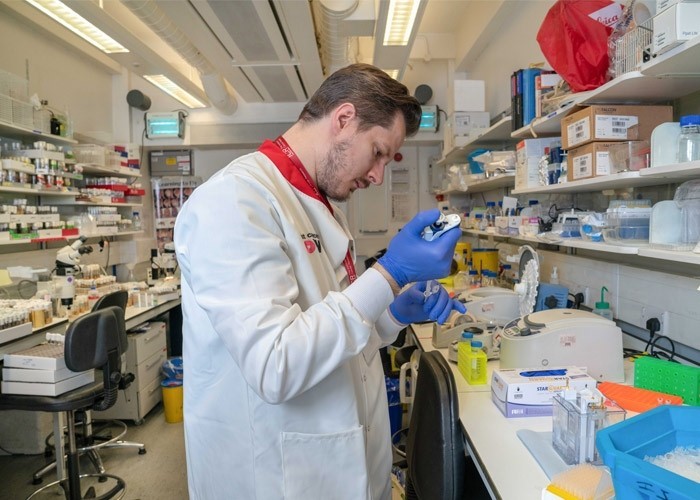We look at three projects we’re funding to help improve the lives of women with breast cancer.

We look at three projects we’re funding to help improve the lives of women with breast cancer.
Research can improve the lives of women with breast cancer, whether it is looking to find new treatments or adapt existing ones, or finding better ways to support women undergoing breast cancer treatment. We explore three research projects that are hoping to find new ways to help those affected by breast cancer.
1. Unlocking new and more effective chemotherapies
Dr Klaus Pors and his team at the University of Bradford are hoping to modify an extremely toxic chemotherapy, so that it can be used to treat breast cancer.
Duocarmycins, the chemotherapy researchers are working on, are so toxic that in their original form they can’t be used as a cancer treatment.
In the lab, they are creating a version of the drug that would only attack cancer cells and have less severe side effects. They are changing the drug so that it is inactive when first given to a patient. The drug only becomes active when it reaches the tumour, meaning it can’t damage other areas of the body.
The team are testing this version of duocarmycin in the laboratory to see if it is effective and, if successful, the new drug could be further tested in clinical trials for people living with breast cancer.
Read more about duocarmycin research >>
2. Empowering women to make informed decisions about breast reconstruction
Professor Diana Harcourt and her team at the University of the West of England, Bristol are developing a new way to help women discuss their priorities when deciding whether to have breast reconstruction surgery.
The team have recruited 190 women with breast cancer who are considering breast reconstruction at four hospitals. Half will have a chance to discuss their priorities for surgery with a specially trained nurse or psychologist. The researchers hope this will help them to discuss their expectations more easily when they meet their surgeon.
At multiple points following surgery, all women will be asked to give a measure of their quality of life and satisfaction with the results of their surgery.
Professor Harcourt hopes that giving women a chance to talk to a specially trained nurse or psychologist can lead to women who choose reconstruction being more satisfied with their decisions and the outcomes of the surgery.
Read more about breast reconstruction research >>
3. Finding new treatment combinations for secondary breast cancer in the brain
Professor Nicola Sibson and her team from the University of Oxford are trying to find new ways to treat breast cancer when it has spread to the brain. When this happens, it is can be difficult to treat as many drugs cannot get through the blood brain barrier. This is a natural filter that protects the brain from harmful chemicals. It only allows certain substances through from the blood to the brain tissues. Because of the blood brain barrier some drugs (for example, chemotherapy) may not be as effective in treating secondary breast cancer in the brain as they are in other parts of the body.
The researchers are investigating whether anti-inflammatory drugs, such as those used to treat arthritis, could be used to treat secondary breast cancer in the brain.
The team are testing a variety of anti-inflammatory drugs in the lab, alongside radiotherapy, to see which one is the most effective. Additionally, the team hope to find ways for healthcare professionals to predict which patients would benefit most from the combination of anti-inflammatory drugs and radiotherapy.
Professor Sibson hopes that by finding new combinations of treatments, which can eventually be tested in patients, they can improve the chances of survival for people with secondary breast cancer and improve their quality of life.
Read more about secondary breast cancer in the brain treatment research >>
Donate to help us continue to provide people affected by breast cancer with support for today and hope for the future.